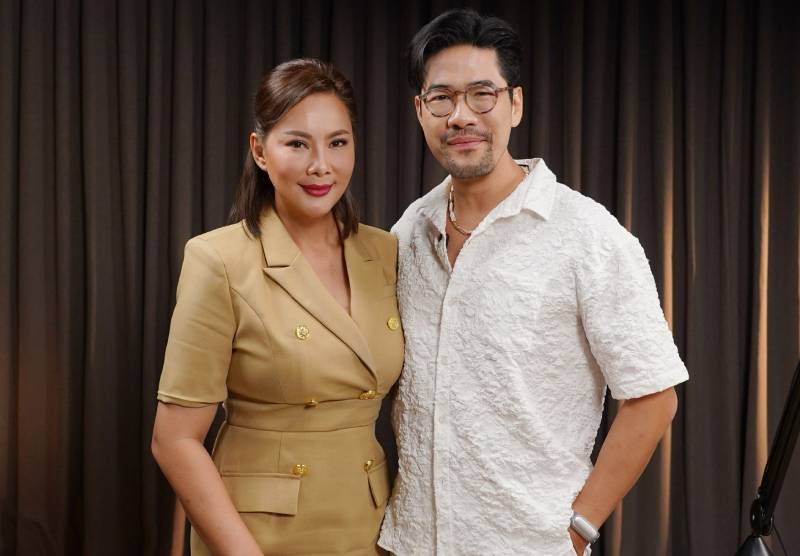The life of a female hero who helps society, “Boom Panadda,” was revealed on WOODY FM. She revealed that she works more in the field than with her family. She explained that despite not earning an income from social work, she believes the smiles of the people bring happiness. She risked her life on the front lines and was targeted in the middle of a battlefield after investing in bunkers to help soldiers on the border. She declared that she still craves the limelight if it helps those in need find a place to stand. She also shared a true story that many may not have known.
What was something in the past that you wasted a lot of time on and now have to stop?
Boom Panadda: Activities that are too strenuous. In the past, I was crazy about spending money on unnecessary things. I bought 10 motorcycles, and I cut out things that were too extravagant. Now I’m happy with myself, happy with my children, happy with being out in the field. I’m very happy. Now I’m only in Bangkok for two days. The other five days are spent in the area. On the border, in the mud, in the floods, with the people. And life is so interesting. But why do I still have to come back to work? We still have responsibilities, children to raise, and our own work to do. I try to balance my life. I don’t get too involved with anything, but I do focus heavily on social work. Now, 75% of my time is spent with social work. More than 20% is spent with family and work.
And what is your main income now?
Boom Panadda: Being a presenter is like many celebrities who don’t have to film dramas or appear on TV shows. But why can I stay home? Because I’ve gotten a lot of presenter work, which is what Boom does.
Then you will spend the remaining time doing social work, which will not earn you any income?
Boom Panadda: Not only did we lose income, but we also lost a lot of money. For example, when we first started building the bunkers, we invested a lot of money. Because Boom went into the area on July 6th, the actual shooting, the actual clash was July 24th. So from July 6th to 24th, we didn’t raise any funds at all. Why? We can’t say. Because we can’t say whether there will be a clash, whether there will be shooting or not. Because we’ve never seen any fighting in our lifetimes, right? In 2011, there was a clash, but the images weren’t as clear as this.
But this time, we felt it was definitely going to happen, it wasn’t normal. I had to build a bunker. I had to do it for the soldiers. That’s how it felt. And then we felt that feeling alone wasn’t enough. We actually did it, but we couldn’t raise the funds. We couldn’t tell the public that there would be a war to ask for money to build a bunker. Everyone would say, Panadda, are you crazy? What’s Panadda talking about? Will there really be a war? Because that image had never happened in Thailand. In the image that we saw of 7-Eleven being attacked or anything, we didn’t have that image in our minds.
Then why was there a dent when making the bunker?
Boom Panadda: I mean, maybe you don’t think about whether the images are real or not. Will they shoot or not or what? If the government budget comes, the winter budget comes in April. If we ask for this winter, it will be released in April because there are many steps to check, right? It’s not in time. But we were there, saw the situation, and we felt like, “No, one life is valuable.”
So you invested in building a bunker?
Boom Panadda: Yes, I actually mortgaged the land. But it was land my husband gave me, so I mortgaged it. My husband didn’t say anything because his father was a soldier.
So what did you learn from making the quick bunker decision?
Boom Panadda: After the battle ended, life was worth it. The soldiers called me and said, “I survived because of my mother’s bunker.” This is a human life story. And there were dozens of bunkers, Woody.
Is there a chance that it will not survive from what happened in the past?
Boom Panadda: As for me, there’s a chance I won’t survive. There is. It’s like what they saw. Someone from an elder whispered to me, saying, “When you go out into the field, please tell me a little bit.” Why? Because they’re marking me. Because they’ve spread rumors that I’m a major sponsor of the army, similar to P’Kan Jom Phalang.
Life as a target is unlikely to be easy, right?
Boom Panadda: If you go somewhere, don’t tell us your schedule in advance. Don’t say anything like, “I’ll go there, I’ll go here.” Don’t say anything. People will come up to you and ask you where you’re going next, what time, and so on. We just say, “I don’t know yet. I’ll just keep going.” That is, don’t mark a spot, don’t tell anyone, anything like that.
Can you say that life now may not be as safe as it used to be?
Boom Panadda: It wasn’t safe at all. Like the event the other day that brought smiles back to the people, Boom held the first concert in Surin and the second in Sa Kaeo, giving away merchandise. That event was dangerous. Amidst the smiles, there was danger because spies came into the area and got them too. The Border Patrol Police secretly told us. When we were standing there, the team said, “There he is, that guy! He really came.”
What’s the situation like now? I’m worried because Thai soldiers still have to stay there.
Boom Panadda: Tense. And now we’re removing all civilians. We must not burden the soldiers with fighting. We must come out of the area and let them do their job to the best of their ability. Consider it as we’ve already packed in, built bunkers, and done everything. The rest is their responsibility. And the rest is just our encouragement. But the local people will say that no matter how tense they are, they won’t give up a single inch of Thai land. They’re willing to do that. We have to thank the people on the border, really. The people in the border areas. Children can’t go to school. They can’t study. Schools have to close.
What are the things that most Thai people don’t know and don’t talk about?
Boom Panadda: Children can’t go to school. Everything is closed. All the shops are closed. Agricultural produce. Imagine that’s a rice field. This is a rubber plantation that needs tapping. This is durian. This is mangoes or whatever. Everything is impossible to harvest. But agricultural produce ripens before the war ends. Everything is already an investment. The villagers have already invested. The fertilizer they borrowed, the expenses they had to pay, the long plowing period, and whatever else, it’s all paid for, but they can’t harvest and sell it.
Income is zero. I’d like to ask the government to do the same. Can you please give them some relief on debt repayment or something? Even tourism has had to stop because no one is traveling, right? Everything is negative. The economy is negative right now. I mean negative. What I do in the area, besides taking care of the soldiers, is also taking care of the people. I do it by doing live broadcasts to show how to buy online in other provinces. This is what we’re trying to do.
If some policy proposals could be proposed to change this, what would need to happen first at the national level to alleviate or ultimately end this issue?
Boom Panadda: It’s difficult to end. I say difficult because I can imagine the conflict that’s so deeply ingrained in the feelings of both Thais and Cambodians that it’s hard to even look at each other. And then there’s the area around Ban Nong Chan in Sa Kaeo. It’ll take years to clear things up. Relations won’t develop easily. It’ll remain murky like this and drag on as long as we don’t receive sincerity from the other side, which seems to be rare. It’s difficult.
The same old question: Are people in the media hungry for attention? Are their actions lacking in the limelight? How do you answer that?
Boom Panadda: In the past, I would have simply answered, “Oh! I don’t seek the limelight.” But today, I’ll answer differently. I really need the limelight. If that limelight can enable me to teleport to those in need, to those who have never received justice, to various areas that have never been seen, and it can capture the media’s attention, attract the public’s attention, and generate funds to help them, or bring them justice, I will teleport that limelight to a level greater than the sun. I really need that limelight. So if you ask if I’m limelight-hungry, yes, I am. Everyone is limelight-hungry, but whether that limelight is used for good or harm is up to me.
What brings you happiness these days, aside from helping so many people? Besides family, what else has kept you going until today?
Boom Panadda: I feel that helping people fulfills my heart. I don’t have to think about increasing my fame. Because if I do more good, I won’t become a leading actress. I’m at a point where I’m saturated in the entertainment industry. I know what each job is like, how to do it, and how it ends. I’ve seen the whole picture. What I want is happiness. From now on, the happiness of helping people, the happiness of seeing the organization’s team doing good become stronger, more productive, and the team can work without me having to be physically there. It’s the system that creates good deeds I’ve dreamed of for a long time. It’s a system like a company, with my mother at the center, coordinating everything together like this. Back then, I didn’t sleep 24/7 for how many days, but I did it and felt incredibly proud. When I succeeded, no one knew. But once I did it and everything worked out, the flood was over, the war was over. I was incredibly proud.
What is one thing you think people will remember from this episode?
Boom Panadda: Many people look up to me and may see me as an idol, perhaps wanting to do good like I do. But I want to say that before we can take care of others, we must first strengthen ourselves. You need to love yourself deeply. Be proud of what you do, and then use that energy to create good things for others. But it has to start with yourself first. Love yourself deeply.





